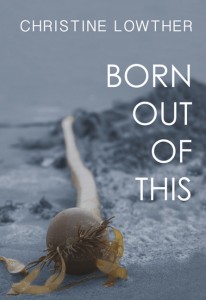January 19, 2015
Born Out of This by Christine Lowther
 Christine Lowther’s essay collection, Born Out of This, is a wild book about life on the margins, in terms of geography, culture, and environmental activism. It also reads like notes in a margin, rich with references to literary texts, song lyrics, poetry (in particular, works by Lowther’s mother, the poet Pat Lowther), and musings on life and nature, the view from her window. Which is not just any window. Christine Lowther makes her home on a house float off the Clayoquot Sound, on the west coast of Vancouver Island, anchored just off shore. A greenhouse sits on an accompanying float, where bees buzz and somehow slugs appear. After the pleasure of reading Sarah Henshaw’s The Bookshop That Floated Away last month, I was pleased to encounter another woman who makes her life on the water. And what a life it is, Lowther partaking in the labours required to keep her house maintained and sound, commuting to work via kayak (and later, motorboat), watching wolves from her deck, swimming with a seal, and (yes) shitting in a bucket. She writes wonderfully about her views of nature, of being immersed in it and still apart from it at once, about the complex and difficult relationships between humans and wild things, between people and place. She writes about the freedom and claustrophobia of rural life, and also about how her idyllic surroundings are not so at odds with her punk roots: “if anyone thinks it’s not punk to live out in nature they should visit during a storm.” Nature is teeming too with death as much as it’s full of life, the opening piece in the collection presenting a stream choked with the bodies of dead salmon, though it’s not strictly a system of binaries: “This landscape of gore nourishes and fertilizes the trees and berry bushes.” And so too is death a shadow in Lowther’s own life; in “Gifts from Lands So Far Apart,” she explores the ways in which the loss of mother was connected to landscape, and this loss subtly haunts the rest of the collection. (The following essay begins: “An infant harbour seal cries for its mother…”) Lowther also explores the roots of her own environmental and political activism, her essay, “We Tremble in Response: Famished for Grief,” an excellent complement to Nancy Lee’s recent novel The Age, both works exploring Vancouver in the early 1980s and a sense of inevitable catastrophe in the nuclear age, the sitting perched on the edge of the world in more ways than just one. Other essays, about community gardening in Vancouver and wildlife in the city, underline Lowther’s connections between here and there, her principle that the rural and urban are not so much at odds, and that indeed their sensibilities mingle.
Christine Lowther’s essay collection, Born Out of This, is a wild book about life on the margins, in terms of geography, culture, and environmental activism. It also reads like notes in a margin, rich with references to literary texts, song lyrics, poetry (in particular, works by Lowther’s mother, the poet Pat Lowther), and musings on life and nature, the view from her window. Which is not just any window. Christine Lowther makes her home on a house float off the Clayoquot Sound, on the west coast of Vancouver Island, anchored just off shore. A greenhouse sits on an accompanying float, where bees buzz and somehow slugs appear. After the pleasure of reading Sarah Henshaw’s The Bookshop That Floated Away last month, I was pleased to encounter another woman who makes her life on the water. And what a life it is, Lowther partaking in the labours required to keep her house maintained and sound, commuting to work via kayak (and later, motorboat), watching wolves from her deck, swimming with a seal, and (yes) shitting in a bucket. She writes wonderfully about her views of nature, of being immersed in it and still apart from it at once, about the complex and difficult relationships between humans and wild things, between people and place. She writes about the freedom and claustrophobia of rural life, and also about how her idyllic surroundings are not so at odds with her punk roots: “if anyone thinks it’s not punk to live out in nature they should visit during a storm.” Nature is teeming too with death as much as it’s full of life, the opening piece in the collection presenting a stream choked with the bodies of dead salmon, though it’s not strictly a system of binaries: “This landscape of gore nourishes and fertilizes the trees and berry bushes.” And so too is death a shadow in Lowther’s own life; in “Gifts from Lands So Far Apart,” she explores the ways in which the loss of mother was connected to landscape, and this loss subtly haunts the rest of the collection. (The following essay begins: “An infant harbour seal cries for its mother…”) Lowther also explores the roots of her own environmental and political activism, her essay, “We Tremble in Response: Famished for Grief,” an excellent complement to Nancy Lee’s recent novel The Age, both works exploring Vancouver in the early 1980s and a sense of inevitable catastrophe in the nuclear age, the sitting perched on the edge of the world in more ways than just one. Other essays, about community gardening in Vancouver and wildlife in the city, underline Lowther’s connections between here and there, her principle that the rural and urban are not so much at odds, and that indeed their sensibilities mingle.





